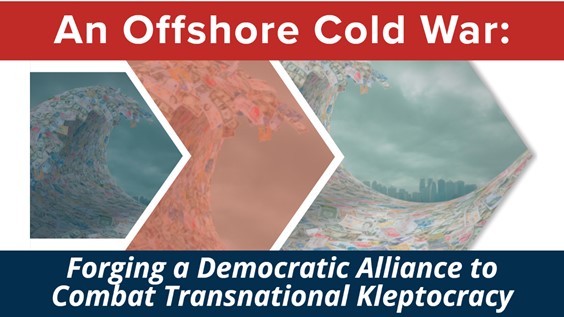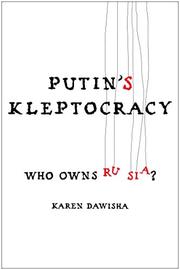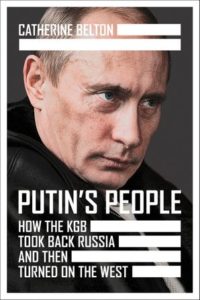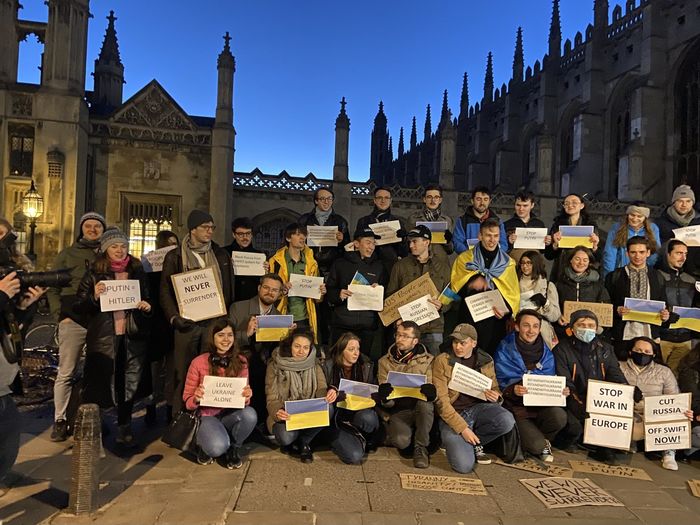In collaboration with European allies, the US Justice Department has launched ‘Task Force KleptoCapture’ to crack down on oligarchs and seize assets.
“To those bolstering the Russian regime through corruption and sanctions evasion: we will deprive you of safe haven and hold you accountable,” said Deputy Attorney General Lisa Monaco. “Oligarchs be warned: we will use every tool to freeze and seize your criminal proceeds.”
Ukrainian civil society activists demanded tougher action against Russian oligarchs at a National Endowment for Democracy forum this morning. Their demands echoed calls at a NED meeting earlier this week which called for a Cold War-like alliance of democracies to combat kleptocracy.

In a 2009 essay on Russia’s “Selective Capitalism and Kleptocracy“? political analyst Daniel Kimmage wrote: “The primary goal of the Russian elite is not to advance an abstract ideal of the national interest or restore some imagined Soviet idyll.” Rather, he added, its goal is “to retain its hold on money and power,” notes Christopher Walker, the NED’s vice president for studies and analysis.
This clear-eyed assessment of Putin’s Russia is even more relevant today than when it was originally published. So, what should free societies have learned since its publication, he asks in American Purpose:
 First, that there is an animating pattern to the way the Kremlin’s long arm reaches beyond its borders. Writing recently in the Wall Street Journal, Yaroslav Tromifov observed that prior to Russia’s invasion of Ukraine in 2014, “the Russian-controlled areas of Ukraine’s Luhansk and Donetsk regions were once the engines of the country’s economy and dominated its politics.” Today, by contrast, the “now nominally independent ‘people’s republics’ inside the larger regions of Luhansk and Donetsk—have turned into impoverished, depopulated enclaves that increasingly rely on Russian subsidies to survive.” ….
First, that there is an animating pattern to the way the Kremlin’s long arm reaches beyond its borders. Writing recently in the Wall Street Journal, Yaroslav Tromifov observed that prior to Russia’s invasion of Ukraine in 2014, “the Russian-controlled areas of Ukraine’s Luhansk and Donetsk regions were once the engines of the country’s economy and dominated its politics.” Today, by contrast, the “now nominally independent ‘people’s republics’ inside the larger regions of Luhansk and Donetsk—have turned into impoverished, depopulated enclaves that increasingly rely on Russian subsidies to survive.” ….- Second, free societies should have learned that the Russian leadership’s imperative of regime security is inseparable from the protection of its kleptocratic architecture….. Catherine Belton’s Putin’s People and Karen Dawisha’s Putin’s Kleptocracy trace the spread of the roots and branches of a transnational kleptocratic system that stretches well beyond the Russian Federation to pose a multidimensional threat to free societies…. Oliver Bullough’s “An Offshore Cold War: Forging a Democratic Alliance to Combat Transnational Kleptocracy” …emphasizes that today’s tyrants “are willing and able to do anything to expand their own power,” but that, unlike during the Cold War era, today “democracies are no longer facing autocracies across well-defended national borders.”
 Finally (and related to Bullough’s contention), democracies must come to grips with the reality that there is a through line between the regime security imperative for the kleptocratic leadership in Moscow and national security in free societies. Open societies today face more acute risks precisely because of the deepened interconnection between autocracies and democracies in which norms of democratic accountability have not been prioritized. RTWT
Finally (and related to Bullough’s contention), democracies must come to grips with the reality that there is a through line between the regime security imperative for the kleptocratic leadership in Moscow and national security in free societies. Open societies today face more acute risks precisely because of the deepened interconnection between autocracies and democracies in which norms of democratic accountability have not been prioritized. RTWT
A new Battle of Britain – in the banks rather than on the beaches – is taking shape, Sarah Manney writes for Cambridge University’s Varsity.
Not to escape blame, the University of Cambridge was named a half-dozen times in a 2021 National Endowment for Democracy report for accepting donations from politically exposed figures such as a Ukrainian oligarch with ties to Russia who is now under international sanctions, she notes.
To be clear, these measures are no substitute for an immediate response to the “hideous and barbaric” conquest of Europe’s largest nation, numbering 44 million people. Manney adds. But the rubles siphoned out of Russia and recycled in the UK are an IV drip sustaining the Kremlin elite, even as ordinary Russians are bled dry by economic sanctions.
 Credit: Varsity. Students rally in support of Ukraine
Credit: Varsity. Students rally in support of Ukraine







